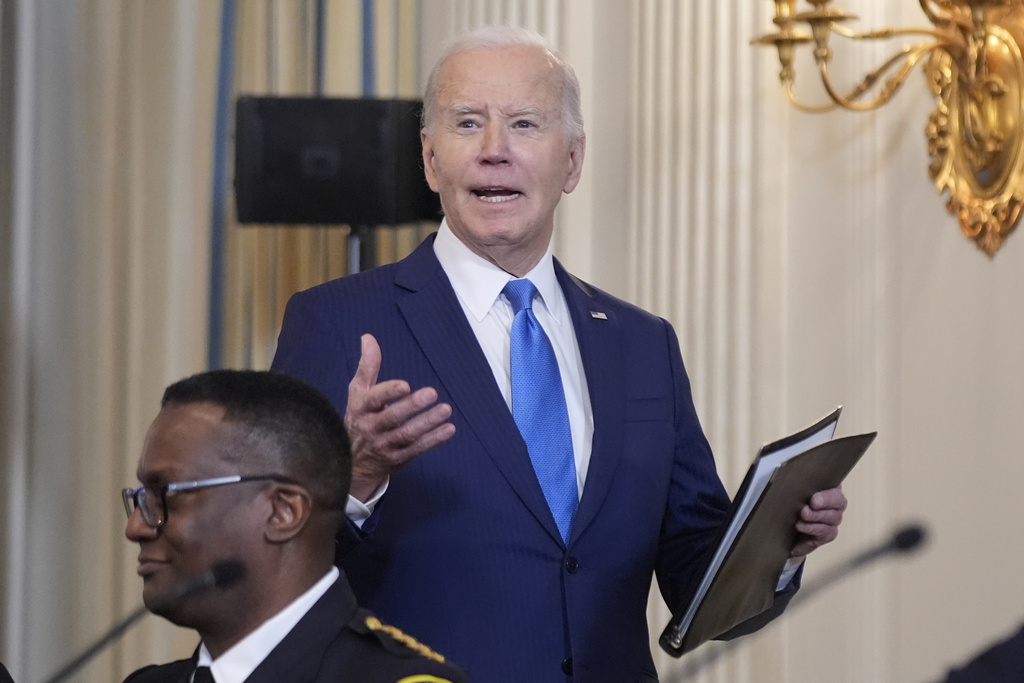

Anger over President Joe Biden‘s handling of the Israel–Hamas war could lead to more backlash as several states prepare to hold primary contests on Super Tuesday on March 5.
Activists are hoping to build on the successful “uncommitted” campaign staged during Tuesday’s Michigan primary, which blunted Biden’s decisive win.
ELECTION 2024: FOLLOW LATEST COVERAGE
Although Biden won 81.1% of the vote with 98% of the ballots counted, the “uncommitted” campaign garnered more than 101,000 votes or 13.3% of the total vote share. The results were well above the modest 10,000 target votes the group had originally aimed for.
It is the latest sign of Arab and Muslim voter dissatisfaction over Biden’s reticence to call for a ceasefire in the war in the Middle East. The sentiment could spread to the 15 states and one territory that will vote on Tuesday.
At least nine of the states with elections on Super Tuesday allow the option of an uncommitted, no preference, or write-in option for voters who are unsatisfied with Biden. Those states include Colorado, Alabama, Maine, Massachusetts, Minnesota, North Carolina, Tennessee, Vermont, and Iowa. Iowa Democrats have an ongoing mail-in contest through Super Tuesday when the results will be announced.
In Colorado, progressive activists are already working on a vote “uncommitted” campaign against Biden. Deep Singh Badhesha, a Denver-based activist, wrote on X that he will not vote for Biden.
“I’m voting for Noncommitted Delegate,” Badhesha said. “Though it’ll be late, if Biden’s polls continue to suffer and a loss to Trump looks likely, it’s up to the Dem Delegates in Chicago in August to fix this and nominate someone who can win.”
Muslim voters in Minnesota, home to progressive Rep. Ilhan Omar (D-MN), are also encouraging voters not to support Biden at the polls. The Minnesota chapter of the Abandon Biden campaign held a press conference Monday, urging Democratic voters to vote “uncommitted.”
“This is a chance for our communities who are impacted by this ongoing war, this conflict, that we have a chance to speak directly to our president who is running for election this year in our state to ask that he avert course,” St. Paul City Councilwoman Mitra Jalali said.
Omar is notably one of the most vocal Democratic House members who have pushed for an immediate ceasefire in Gaza.
“It’s been 100 days since I signed on to the ceasefire resolution,” the congresswoman wrote on X in January. “In that time more than 25,000 thousand Palestinians have been killed by Israeli soldiers. I will continue to call for a ceasefire until there is an end to the atrocities and lasting peace. I urge my colleagues to do the same.”
Omar’s office did not respond to the Washington Examiner‘s request on whether she supports the “uncommitted” campaign in Minnesota.
An exit poll of 527 Muslim voters who voted in Michigan’s primary showed that 94% voted “uncommitted,” according to the Council on American-Islamic Relations and its Michigan chapter, a sign of the fury Biden is facing from voters in the crucial battleground Wolverine State.
The survey also found that if the election were held today, 40% of Muslim voters would support an unnamed “other candidate,” 25% would vote for third-party candidate Cornel West, 13% would support Trump, 8% would support Biden, 8% would back third-party candidate Robert F. Kennedy Jr., and 7% would support Green Party candidate Jill Stein.
“Based on our exit poll and our interactions with Muslim voters, it appears that President Biden’s unconditional support for the Israeli government’s genocide in Gaza is likely playing a decisive factor in impacting his support within the Muslim and Arab-American communities,” CAIR Government Affairs Director Robert S. McCaw said in a statement.
In Washtenaw County, where the University of Michigan is located, the “uncommitted” option garnered 17.2% of votes, a sign of youth anger with Biden. In Ingham County, where Michigan State University is located, the “uncommitted” vote garnered 13.2% support.
Mack Shelley, a political scientist at Iowa State University, told the Washington Examiner that the Biden campaign should be concerned about the impact of the “uncommitted” vote.
“Losing 13.3% to ‘uncommitted,’ that’s not very good,” Shelley said. “The incumbent president should be at 90-something percent support.”
In their separate statements celebrating the Michigan win, neither Biden nor Vice President Kamala Harris directly addressed the 101,000 people who cast “uncommitted” votes.
“I would think there are going to be efforts to vacate that voting bloc,” Shelley continued about the coalition of Democratic voters, particularly younger voters, turned off by Biden’s handling of the war. “It’s not the first time this sort of thing has happened — wars in Vietnam, Iraq, and others, you know, tend to produce this kind of situation. And it does make it kind of tricky for particularly an incumbent Democratic president to win in the face of sort of natural constituency, younger people in general, saying, ‘Look, we’re not going to support you.’”
Biden’s hesitation to fully pressure Israel into a ceasefire may stem from America’s unequivocal support of the nation and the reticence to stoke the anger of the Democratic establishment members and their allies.
Yet if the anger over the Israel-Hamas war continues, as it appears to be doing, Biden will need to appease the protest voters quickly before the November election.
CLICK HERE TO READ MORE FROM THE WASHINGTON EXAMINER
Arab, Muslim, and young voters were key to Biden’s winning coalition in 2020, but if they abandon the president in November, it could spell the end of his time in the White House.
Biden is still the heavy favorite to win the Democratic presidential nomination, but more significant “uncommitted” votes suggest there is more to be done to recreate his 2020 coalition.




